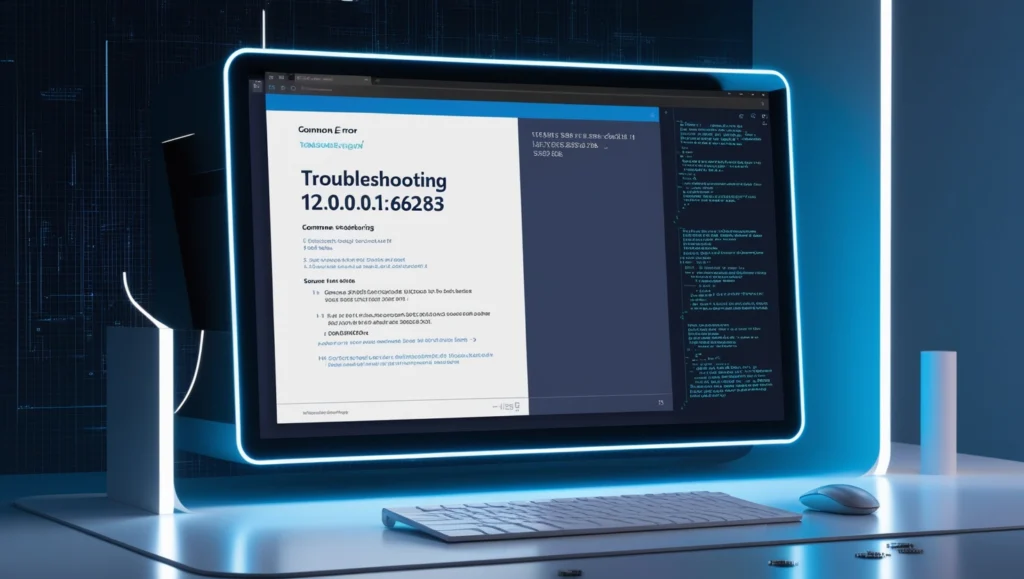When dealing with software and network development, addresses like 127.0.0.1 or 127.0.0.1:62893 may seem confusing, but they are actually straightforward once you understand what they represent. These IP addresses serve specific roles in the system, and grasping their purpose can simplify how you develop and troubleshoot software 127.0.0.1:62893 .
What is the 127.0.0.1 IP Address and 127.0.0.1:62893?
127.0.0.1 is known as a loopback address or “localhost.” It is a special IP address that always points to the machine you’re using. Essentially, it allows a computer to talk to itself without needing an external network. This is commonly used when a user or a program wants to connect to a service running on the local machine.
Sometimes, you might see an address with an additional number, like 127.0.0.1:62893. That extra part after the colon (62893) represents a port, which is a specific channel that helps direct different types of communication within the computer. Think of the IP address as the street address and the port as the apartment number, guiding where to send or receive data.
How Loopback Works in Communication
When programs use 127.0.0.1:62893, they are referring to a specific service running on the local machine. Messages are routed through the system’s IP/TCP stack, ensuring communication happens internally. This allows the computer to send data to itself without needing external connections, making it useful for testing and internal services.
Benefits of Using the Localhost Address
- Network Testing: You can verify whether the network stack is functioning properly on your machine.
- Connecting to Local Services: You can access services like a web server running on your own machine, even without an active internet connection.
- Security: By filtering messages through the router, loopback can block external threats and prevent unauthorized access, improving your computer’s security.
- Message Routing: Loopback ensures that incoming messages are processed as if they’re from an external server, even when they originate from the same machine.
- Device Communication: Developers can use the loopback address to test how their software interacts with other systems. This includes using localhost to access local services or test web server requests.
- Software Testing: Loopback enables you to test software functionality locally before deploying it on the internet, reducing the risk of failure.
- Efficiency: Since communication happens within the machine, responses are faster than those sent over a network, making it a valuable tool for benchmarking application performance.
- Safe Development Environment: Loopback offers a sandbox for experimenting with new features, allowing developers to test changes without impacting live systems.
How to Find Your IP Address
If you need to access the loopback address or find your computer’s IP address, here’s how to do it:
- On Windows: Open the Start menu, type “CMD” to launch the Command Prompt, then type
ipconfig. This will display your machine’s IP addresses. - On Linux: Press
Ctrl + Alt + Tto open a terminal, then typeifconfigto view your network configuration.
Once you have the IP address, you can enter it into your browser to view locally hosted web pages or applications. For example, typing 127.0.0.1 may display the default Apache web server page if you’re running one. If nothing shows, your server may not be running, and a restart may be required.
Frequently Asked Questions (FAQs)
1. Can I make HTTP requests locally without an internet connection?
Yes. Your computer doesn’t need to be online to access localhost. It communicates with itself using the loopback address.
2. What’s the difference between localhost and IPv6 addresses?127.0.0.1 is the default IPv4 loopback address, while IPv6 has a corresponding loopback address of ::1. Both serve similar purposes, but IPv6 addresses use a different format.
3. Can I block websites using loopback addresses?
Yes, you can block websites by editing your computer’s hosts file. Add 127.0.0.1 followed by the website URL, and save the file. This will redirect attempts to access that site to your local machine.
4. Can system restore fix a proxy virus error like 127.0.0.1:62893?
Yes, if you suspect a recent download caused a proxy-related issue, running a system restore can remove it without affecting your important files.
Read Article About connections hint



